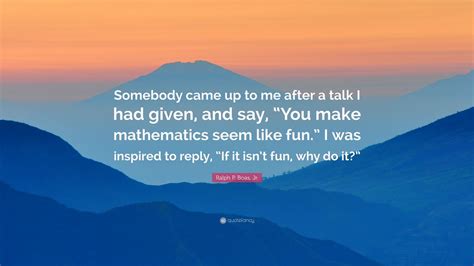A Quote by Ralph P. Boas, Jr.
Only professional mathematicians learn anything from proofs. Other people learn from explanations.
Quote Topics
Related Quotes
Mathematicians are proud of the fact that, generally, they do their work with a piece of chalk and a blackboard. They value hand-done proofs above all else. A big question in mathematics today is whether or not computational proofs are legitimate. Some mathematicians won't accept computational proofs and insist that a real proof must be done by the human hand and mind, using equations.
They say that there are three kinds of people in the world. There are people who never learn one way or another anything; there are people who learn from their own mistakes, eventually and with great pain; and then there are the really wise people who learn from other people's mistakes and spare themselves the suffering.
When you learn to read and write, it opens up opportunities for you to learn so many other things. When you learn to read, you can then read to learn. And it's the same thing with coding. If you learn to code, you can code to learn. Now some of the things you can learn are sort of obvious. You learn more about how computers work.
I didn't study anything really. I didn't learn out of the books because I couldn't read music very well, so it is what they say it is - you learn from other people. And my cohorts and I would sneak around the coffee shops and hear stuff we wanted to learn, and then you ask whoever was playing it to teach you.
When you venture at life with curiosity, you can learn from anything. You learn from things that you could never maybe thought you could learn from. And when you actually step into the room with a lot of people who have an education in a classroom, that is very similar to other people's educations, you'll actually come with a unique perspective that could be a valuable perspective that creates an innovation that could change the world.
As far as I know, Clifford Pickover is the first mathematician to write a book about areas where math and theology overlap. Are there mathematical proofs of God? Who are the great mathematicians who believed in a deity? Does numerology lead anywhere when applied to sacred literature? Pickover covers these and many other off-trail topics with his usual verve, humor, and clarity. And along the way the reader will learn a great deal of serious mathematics.
I don't think anybody can teach anybody anything. I think that you learn it, but the young writer that is as I say demon-driven and wants to learn and has got to write, he don't know why, he will learn from almost any source that he finds. He will learn from older people who are not writers, he will learn from writers, but he learns it -- you can't teach it.
Nothing fails like success, because we do not learn anything from it. We only learn from failure, but we do not always learn the right things from failure. If there is a failure of expectations, that is, if the messages that we receive are not the same as those we expected, we can make three possible inferences.





































